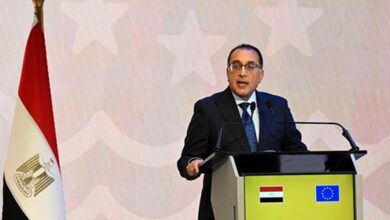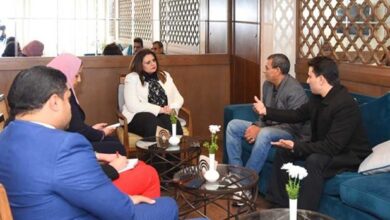A new parliament dominated by the ruling National Democratic Party (NDP) is expected to pave the way for more investment-friendly regulations. Yet obstacles linger, notably with regards to political stability.
In his first speech before the new parliament on 19 December, President Hosni Mubarak introduced plans to boost the investment environment, raise the annual growth rate and create 700,000 jobs in 2011.
Egypt's economy grew by around 7 percent in each of the three years before the global economic crisis. Growth then slipped to 4.7 percent in 2008-09, and rose to 5.1 percent in 2009-10. Finance Minister Youssef Boutros Ghali on 13 December forecast growth of 7 percent in 2011-12 and 8-8.5 percent thereafter.
Experts say that the structure of the parliament–in which 35 percent of the seats belong to businessmen–would boost this economic progress, by passing legislation that would further improve the investment environment.
This is particularly relevant given the fact that around 30 of the most powerful businessmen in Egypt are members of the new parliament, including steel tycoon Ahmed Ezz, ceramics magnate Mohamed Abou el-Enein and Tarek Talaat Moustafa, chairman of one of the largest real-estate conglomerates in Egypt.
However, political stability, and most notably, the 2011 presidential elections, are considered important elements in determining the investment atmosphere.
"Inflation is ticking higher and presidential elections are approaching," says a Business Monitor International (BMI) report issued in December. The government will be unable to challenge the fact that "the budget deficit will remain uncomfortably high in 2011."
"We would not be surprised to see investors shy away from major investment projects until a clearer picture on the succession question appears," adds the BMI report.
Besides the question of succession, some note that the exclusion of the opposition from the November parliamentary poll through a rigged electoral process might lead to the radicalization of this opposition, which in turn threatens stability.
This uncertainty "could worsen prospects for foreign investment needed to kick-start domestic investment and diversify growth away from consumption," wrote Ayah El Said of Roubini Global Economics. “Even though Roubini Global Economics does not expect a regime change, policy uncertainty could add volatility to asset markets, decrease trading volumes and deter potential investment until the election cycle is clearer,” El Said adds.
The NDP is expected to be cautious about its economic policies, given its monopoly over parliament, with 80 percent of its seats. "Don't forget that we have a presidential elections next year; you can't pass the laws you wish especially with the absence of opposition in the parliament,” says Essam Montasser, economic analyst.
Meanwhile, among the new legislation the NDP plans to implement are laws concerning the administration of state-owned land usage, observers note.
Experts consider the move a plot to avoid a recent court ruling obliging the government to scrap the direct sale of state land to the Talaat Moustafa Group's (TMG) Madinaty land project.
TMG's US$3 billion Madinaty project has been mired in a legal row since a court ruling that the property must be sold by auction, sparking concern among investors that other state land sales may also be challenged.
The government's answer was to scrap the original contract and return the land to TMG, Egypt's largest known developer, under a new deal with the same terms, based on its right to act in the national interest.
"The new law aims at ending the ambiguity about land sales, as a unified sovereign body will tackle all the issues related to state-owned land," said Ahmed al-Zainy, Vice President of Egypt's Building Materials Chamber.
In September, shares in Palm Hills, which builds mostly in Egypt's luxury segment, closed down 4.4 percent. TMG finished 11 percent lower. Other real estate firms’ shares also slid.
"The NDP majority will hasten the issuing of such a law, which is highly needed to defend the stability of the real estate market and foster the investment environment that was affected badly after TMG's ruling," argues al-Zainy.
"In 2009, Egypt's real estate market witnessed an unprecedented boom in which the market used around 50 million tons of cement and more than seven million tons of steel. Despite the global financial crisis, the sector achieved major success," he says.
Such facts, in addition to the limited effect of the global economic downturn on the Egyptian economy, have led Egypt to become "one of the best markets not only in the Middle East but also in the world in terms of real estate investors in 2010," according to al-Zainy.
However, the NDP has other economic obstacles to confront in order to improve the investment environment.
The foremost concerns for the country in 2011 are the stability of the Egyptian pound and containing the budget deficit.
The new tax regime revenues caused the budget deficit in the fiscal year 2009-2010 to shrink from 8.3 to 8.1 percent of GDP, the Ministry of Finance said in September.
However, analysts estimate that Egypt’s budget deficit is set to widen in the next financial year to LE109.3 billion and the total government debt will increase to 77 percent of GDP, up from 66 percent in the last two years.
The second concern is about the Egyptian pound. "Following the vote, the unit sold off to a new five-year low at EGP5.7866 (US$0.9964) on 29 November, with the Central Bank of Egypt appearing increasingly unwilling to defend the currency,” says the BMI report.
While BMI doesn’t expect the unit to fall below key support at EGP5.8000, it sees that volatility will still dominate the foreign exchange market.
With key political questions unresolved, uncertainties are expected to loom around the country’s investment environment, transcending positive-looking economic growth graphs.




